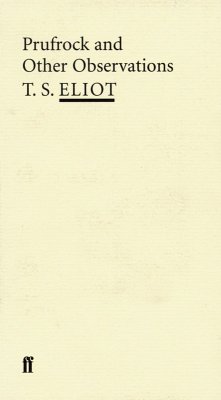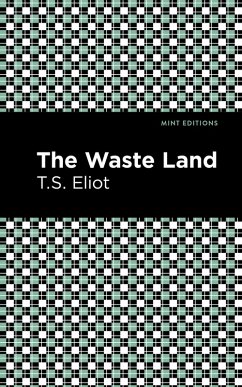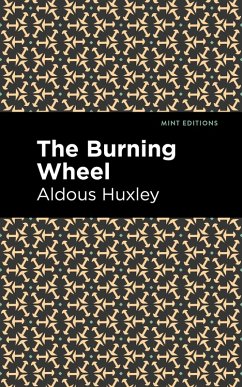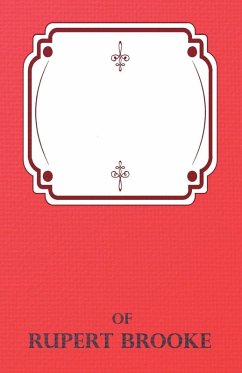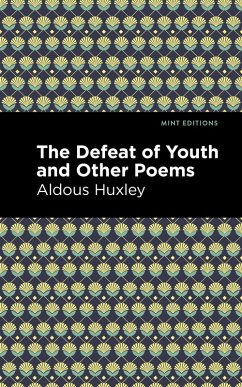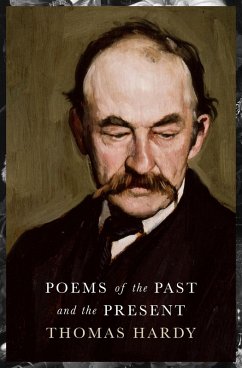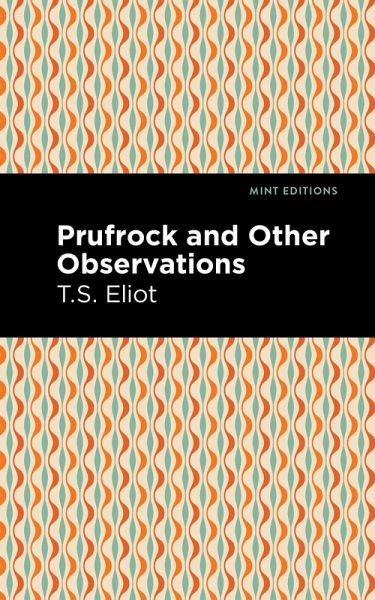
Prufrock and Other Observations (eBook, ePUB)
Versandkostenfrei!
Sofort per Download lieferbar
2,99 €
inkl. MwSt.
Weitere Ausgaben:

PAYBACK Punkte
1 °P sammeln!
Prufrock and Other Observations (1917) is a collection of poems by T.S. Eliot. Published following the successful appearance of "The Love Song of J. Alfred Prufrock" in the June 1915 issue of Poetry: A Magazine of Verse, Prufrock and Other Observations established Eliot's reputation as a leading English poet and pioneering literary Modernist.Opening with "The Love Song of J. Alfred Prufrock," the collection begins with an invocation of Dante, whom Eliot saw as an important innovator of a polyphonic, referential poetry capable of interrogating and dramatizing the construction and representation...
Prufrock and Other Observations (1917) is a collection of poems by T.S. Eliot. Published following the successful appearance of "The Love Song of J. Alfred Prufrock" in the June 1915 issue of Poetry: A Magazine of Verse, Prufrock and Other Observations established Eliot's reputation as a leading English poet and pioneering literary Modernist.
Opening with "The Love Song of J. Alfred Prufrock," the collection begins with an invocation of Dante, whom Eliot saw as an important innovator of a polyphonic, referential poetry capable of interrogating and dramatizing the construction and representation of the self. The poem is written from the perspective of a repressed, despairing middle-aged man who meditates on his relationships with women and the regrets he has accumulated with age. In "Preludes," a poem of urban malaise, Eliot "thinks of all the hands / That are raising dingy shades / In a thousand furnished rooms," and reaches for an understanding of the world as "some infinitely gentle / Infinitely suffering thing." Other poems include "Morning at the Window," another brief vision of city life, "The Boston Evening Transcript," a satirical reverie on time and community, and "Cousin Nancy," a humorous lyric celebrating Miss Nancy Ellicott, who unabashedly "smoked, / And danced all the modern dances. Both personal and universal, global in scope and intensely insular, Eliot's poetry changed the course of literary history, inspiring countless poets and establishing his reputation as one of the foremost artists of his generation.
This edition of T.S. Eliot's Prufrock and Other Observations is a classic of English literature reimagined for modern readers.
Since our inception in 2020, Mint Editions has kept sustainability and innovation at the forefront of our mission. Each and every Mint Edition title gets a fresh, professionally typeset manuscript and a dazzling new cover, all while maintaining the integrity of the original book.
With thousands of titles in our collection, we aim to spotlight diverse public domain works to help them find modern audiences. Mint Editions celebrates a breadth of literary works, curated from both canonical and overlooked classics from writers around the globe.
Opening with "The Love Song of J. Alfred Prufrock," the collection begins with an invocation of Dante, whom Eliot saw as an important innovator of a polyphonic, referential poetry capable of interrogating and dramatizing the construction and representation of the self. The poem is written from the perspective of a repressed, despairing middle-aged man who meditates on his relationships with women and the regrets he has accumulated with age. In "Preludes," a poem of urban malaise, Eliot "thinks of all the hands / That are raising dingy shades / In a thousand furnished rooms," and reaches for an understanding of the world as "some infinitely gentle / Infinitely suffering thing." Other poems include "Morning at the Window," another brief vision of city life, "The Boston Evening Transcript," a satirical reverie on time and community, and "Cousin Nancy," a humorous lyric celebrating Miss Nancy Ellicott, who unabashedly "smoked, / And danced all the modern dances. Both personal and universal, global in scope and intensely insular, Eliot's poetry changed the course of literary history, inspiring countless poets and establishing his reputation as one of the foremost artists of his generation.
This edition of T.S. Eliot's Prufrock and Other Observations is a classic of English literature reimagined for modern readers.
Since our inception in 2020, Mint Editions has kept sustainability and innovation at the forefront of our mission. Each and every Mint Edition title gets a fresh, professionally typeset manuscript and a dazzling new cover, all while maintaining the integrity of the original book.
With thousands of titles in our collection, we aim to spotlight diverse public domain works to help them find modern audiences. Mint Editions celebrates a breadth of literary works, curated from both canonical and overlooked classics from writers around the globe.
Dieser Download kann aus rechtlichen Gründen nur mit Rechnungsadresse in A, D ausgeliefert werden.





